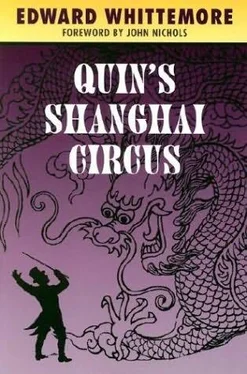Edward Whittemore - Quin’s Shanghai Circus
Здесь есть возможность читать онлайн «Edward Whittemore - Quin’s Shanghai Circus» весь текст электронной книги совершенно бесплатно (целиком полную версию без сокращений). В некоторых случаях можно слушать аудио, скачать через торрент в формате fb2 и присутствует краткое содержание. Жанр: Фэнтези, на английском языке. Описание произведения, (предисловие) а так же отзывы посетителей доступны на портале библиотеки ЛибКат.
- Название:Quin’s Shanghai Circus
- Автор:
- Жанр:
- Год:неизвестен
- ISBN:нет данных
- Рейтинг книги:3 / 5. Голосов: 1
-
Избранное:Добавить в избранное
- Отзывы:
-
Ваша оценка:
- 60
- 1
- 2
- 3
- 4
- 5
Quin’s Shanghai Circus: краткое содержание, описание и аннотация
Предлагаем к чтению аннотацию, описание, краткое содержание или предисловие (зависит от того, что написал сам автор книги «Quin’s Shanghai Circus»). Если вы не нашли необходимую информацию о книге — напишите в комментариях, мы постараемся отыскать её.
Quin’s Shanghai Circus — читать онлайн бесплатно полную книгу (весь текст) целиком
Ниже представлен текст книги, разбитый по страницам. Система сохранения места последней прочитанной страницы, позволяет с удобством читать онлайн бесплатно книгу «Quin’s Shanghai Circus», без необходимости каждый раз заново искать на чём Вы остановились. Поставьте закладку, и сможете в любой момент перейти на страницу, на которой закончили чтение.
Интервал:
Закладка:
The year Mama left home a son was born to the couple. They kept him because their daughter was gone. After the war this man, who had the body hair of his mother, confessed a long list of crimes to Geraty, a heinous record of torture and arson, killing and sexual perversion that stretched from Siberia to Mukden to Shanghai and up the valley of the Yangtze, that included among many atrocities the murder of Miya’s son and the murder of the Japanese General responsible for the rape of Nanking. It was from him that Geraty stole the military greatcoat he was wearing the night he first met Quin, not by accident, in the bar in the Bronx once owned by Geraty’s father.
As for Mama, she never knew she had a brother, neither then nor years later when the night came for him to murder both her surviving son and Hato, the freighter passenger on the Pacific crossing who had worn a false moustache and false sideburns and so angrily kept the secret of his shoeboxes from Quin and Big Gobi.
Although she was only eight years old when she went to the house in Kobe, Mama soon came to know the customs of the world from the sailors who passed through that busy port. Throughout her childhood she was tattooed a part at a time, as was customary at the beginning of the century for Japanese children entering a serious life of prostitution or crime.
When puberty came her body was entirely covered with tattoos with the exception of her face and her hands and feet. The tattoos recounted the epic story of a dragon. The dragon’s tail curled around her waist, its fiery breath licked her stomach, its tongue forked into her crotch, its eyes peered from her nipples.
On her backside, in even more terrifying guises, the theme was repeated with variations.
Thus when a visiting knight sagged in bed, thinking he had met the challenge and triumphed, slain the dragon and earned a night’s sleep, Mama had but to whisper to him in the candlelight to prove that facts were always illusionary when compared to myths.
Turn me over, she suggested.
And sure enough, as soon as the tired warrior turned her over the dangers of the night returned and he was faced with a whole new saga of battles and miracles.
The dragon tattoo was a masterpiece, the most intricate anybody had ever seen. Her epic became legendary in the ports of Asia and soon she was in great demand.
In particular she appealed to opium addicts, who were convinced they would never be able to make love to a woman again. But Mama showed them there could be more to puffing the magic dragon than they had ever suspected.
Mama worked first in the Chinese wing of the brothel, since the Chinese were not only the principal opium addicts but also the principal seducers of virgins. The older Chinese men, bent on deflowering the world now that they had reached an advanced age, would pay almost any price if they thought they were getting a virgin. Being small, Mama was able to serve this lust in the Chinese wing for several years.
From there, for seasoning, she was sent to the Korean wing with its rich smells of garlic and fermenting cabbage, then back to the sailors’ section to relearn any of the international traits she might have forgotten from her childhood.
Lastly, sixteen years old and fully experienced in all carnal matters, she was certified an apprentice Japanese woman and allowed to enter the Japanese wing on trial.
Mama studied fortune-telling, music, conversation, and especially the match-stick games with which Japanese men were sexually aroused. She learned to arrange stones, to pour water over tea, to fold a piece of paper into the shape of a crane. In return she was given diamonds and emeralds and cameras, which were just then being developed.
When she was twenty she bought her way out of the brothel and established herself as an official second wife available by the year, month, week, or half-hour. Over the following four years an astonishing number of Japan’s future leaders passed her way, including, one weekend, an entire graduating class from Tokyo University that eventually produced three prime ministers, forty suicides, and the postwar head of the Communist party.
In 1929, at the age of twenty-four, she finally decided to stabilize her life by forming a permanent liaison. Because of the growing influence of the army in the country, she chose an army general, a man who happened to be not only wealthy but an aristocrat as well.
Baron Kikuchi’s fortune came from his large landholdings in the Tohoku, the same northern district where Mama had been born in poverty. He was the younger of twin sons, born eight minutes after his brother, so the barony had not originally been his. But when his elder brother converted to Judaism after the First World War, he inherited the title.
The twin boys never knew their father, a famous statesman in the middle of the nineteenth century who was one of the leaders of the Meiji Restoration, the movement that overthrew the military dictatorship that had governed Japan for two and a half centuries and returned the Emperor to power. The old Baron, a close friend of the Emperor Meiji, was instrumental in opening the country to Western ways. In fact, he was so involved with modernizing the country he didn’t marry until his eighty-eighth year, whereupon he fathered twins and died.
The twins were raised by their mother, a gentle, strong-willed aristocrat sixty-four years younger than her famous husband. Unlike him, she took no interest in ships or railroads or Western education. She preferred to occupy herself with the traditional arts, painting and tea ceremony and the koto or Japanese harp, and especially with the intricacies of Go , an unusual avocation for a woman since the ancient game had military overtones and was always played by men.
During their early years the twins were educated at home on the estate owned by their ancestors since the thirteenth century, another famous statesman in the family having gone to the aid of the warriors in Kamakura at that time and received land in the north as a reward. But although the estate was large and the family’s wealth great, the twins and their mother lived austerely in keeping with the practice of the northern Japanese.
Their house was small. Their two or three servants lived with them more like aunts and uncles than retainers. The scroll on the wall might be the gift of an emperor, the Go set in the cupboard might be the work of a master craftsman who had made no more than eight such sets in his career, the koto in the closet might be a thousand years old, the bowls used in the tea ceremony might be so exquisitely turned as to be of inestimable value.
Yet the room where the scroll was hung, where the koto was laid out in the mornings and the Go set in the evenings, where the Baroness performed the tea ceremony for her sons every day at sunset, was a small room made of wood and straw and rice paper, as severe in line and simple in design as that of any peasant living on their lands.
And so with the other rooms in the house, with the bare corridors and the plain entrance and the narrow garden where one weathered stone lantern received the blossoms of the fruit trees in spring, the hard sun in summer, the Siberian gales in autumn, and the heavy snows in winter.
The effect the Baroness had on her sons was lasting, particularly the strength they felt in her presence.
From the Baroness the elder twin acquired his passion for painting, to which he devoted the first half of his life, and his love for the koto , which was his principal form of relaxation after he returned from Jerusalem as a rabbi.
From her knowledge of the game of Go the younger twin evolved his fascination with military maneuvering, while it was the rigorous discipline of her tea ceremony that proved to be his only escape, later in life, from the massive headaches that tormented him.
Читать дальшеИнтервал:
Закладка:
Похожие книги на «Quin’s Shanghai Circus»
Представляем Вашему вниманию похожие книги на «Quin’s Shanghai Circus» списком для выбора. Мы отобрали схожую по названию и смыслу литературу в надежде предоставить читателям больше вариантов отыскать новые, интересные, ещё непрочитанные произведения.
Обсуждение, отзывы о книге «Quin’s Shanghai Circus» и просто собственные мнения читателей. Оставьте ваши комментарии, напишите, что Вы думаете о произведении, его смысле или главных героях. Укажите что конкретно понравилось, а что нет, и почему Вы так считаете.












